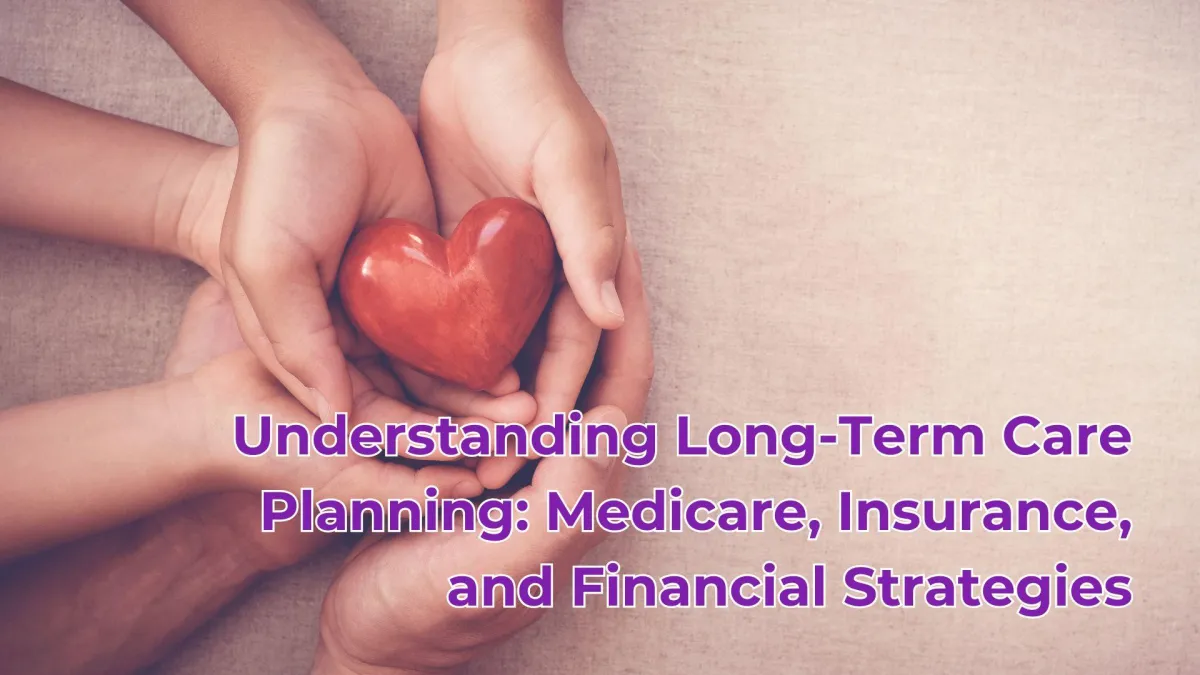



Understanding Long-Term Care Planning: Medicare, Insurance, and Financial Strategies
Understanding Long-Term Care Planning: Medicare, Insurance, and Financial Strategies
Is your financial house in order for long-term care? Discover the critical differences between healthcare and long-term care, what Medicare covers, and the importance of long-term care insurance. Learn how to avoid unexpected costs, manage tax implications, and explore various insurance options. Expert insights on planning for a secure future.
Is your financial house in order, or is it like the cat’s?
Now is a good time to remember the difference. Previously we touched on what Medicare covers and does not cover. Healthcare and long-term care are not the same thing.
Medicare is healthcare for seniors that will pay for limited Skilled Nursing at a recovery facility when rehabilitating from a hospital stay. You're residing there for up to 100 days. Medicare is mainly for Doctors and Hospitals. Medicare does not pay for habilitative (routine living) facilities.
As you consider the cost of habilitative care–long-term care–one thing to remember is if your source of funds was never taxed you could find yourself in this vicious circle of needing to withdraw more money to net what you need after taxes. This could kick you into a higher marginal rate, so you need to withdraw even more to net proportionally less! Not just for long-term care, the money could be for a big trip or to replace your roof. The IRS cherry on top is your large withdrawal counts as income that could kick you into paying what's called Income Related Monthly Adjusted Amounts (unaffectionately called IRMAA) for your parts B and D Medicare premium. This could mean hundreds of dollars per month of extra (what the IRS calls “means-tested”) premium. Or a tax on a tax.
We’ve all heard the retail marketing expression, “The more you spend, the more you save!”
The “IRS version is, the more you withdraw the less you keep!”
This is yet another reason to consult a skilled financial advisor because there’s a two year delay between that large withdrawal and the Medicare IRMAA premiums. Also, if you're receiving long-term care, someone you trust must keep an eye on your Medicare supplemental coverage. And part of that is knowing the difference between Medicare Part C, Medicare Advantage, and traditional Medicare Parts B & D. Medicare Part C can sound really good. I'm not saying it's bad, but I'm saying frequently people think they have better coverage than they really do.
Medical events such as a stroke or a fall can trigger the need for long-term care. In that case you would need to transition from a Medicare-covered situation to a not-Medicare-covered situation. Now it's a long-term care situation. Who's navigating this for you?
Were you already familiar with IRMAA before I brought it up?
Yes or no?
These are extra expenses that must be paid from somewhere. My question is, do you want other people's money or your money to cover it? Now we might not care about what our kids get after we pass. Some of us care a lot. Some of us don't care at all. Every situation is family-specific, and that's fine. But for those families that have heirs or future heirs expecting some kind of inheritance, we will say that they don't mind your spending somebody else's money on their care. They might mind spending what they view as their inheritance on your care. I hope not, but that could be the case.
Insurance is somebody else's money, it's other people's money. At least the benefits beyond what you've paid in premiums. So let's just be totally up front about that. When you pay for insurance, there's a premium, and once there's a benefit paid, you probably look at it and say, well, at least when I get my premium back, right? And long-term care, many people get that and much more.
But the insurance for long-term care should not be considered an all-or-nothing decision. Rather, look hard at Partial funding. Partial as in the case of the couple that left their home and went into assisted living. Maybe assisted living costs more than it costs to live at home, but they had already planned to pay for their home, so now they only need to pay the additional costs and from other people's money. In this case, maybe long-term care insurance. So you don't need to necessarily plan 100% of your long-term care costs to come from insurance. Partial funding makes a lot more sense in most circumstances.
Have you met someone who said, oh, I'm self-insured? Well, I'm going to get a little persnickety about semantics, because frankly, nobody can self-insure. Insurance is turning premium pennies into benefit dollars upon a triggering event.
Think of life insurance. A great example would be someone who's young and healthy and paying $20 a month for a $1,000,000 term policy, and maybe they've paid, you know, $2,000 into it. The insured perishes in an accident and the $1,000,000 pays out. There is no self-insuring in that case. You pay a premium for insurance. It's actually a healthy form of leverage.
We hear a lot about credit cards turning pennies of spending into dollars of debt through compounding interest working against you. That’s a destructive form of leverage. But insurance, including for long-term care, is investing those pennies into some kind of a premium that turns into dollars, often tax-free dollars, when you need them the most.
My question is, should all your planning options be on the table, you know, a full deck of cards, or are you ruling some out because of some personality on the radio? Remember, media personalities are selling something: could be books, could be subscriptions, could be who knows what? And it's a free country, we can all do that, right? We can all sell something.
The problem is when a set of groupies love what this person says, takes it as gospel, and runs with it, and the next thing you know, they're not playing with a full deck. Tack on the issue of taxes and repositioning for tax efficiency. It's not something that happens in a single transaction. It takes years of planning and years of strategic transactions to prevent you from having to pay more than you're really obligated to pay.
Name your specific funding source for those extra expenses of long-term care.
Why long-term care insurance? The real intent is to help you pay for care that extends beyond your ability or your comfort level to self-fund. I didn't say self-insure, I said self-fund. Perhaps you simply want to avoid scrambling your nest egg by accelerating your expenses into long-term care. You want that third party paying a good portion of it.
Then there's tax efficiency. If you're paying purely out of pocket, the first seven and a half percent of your adjusted gross income is not going to be a tax deduction. You can deduct what you spend on eligible long-term care expenses that are beyond that amount. Using long-term care insurance, you can reposition assets for tax-free benefits. You can reposition your assets for tax efficiency. Also, a true long-term care insurance policy typically has what's called Care Coordination which entails a third party helping you navigate the maze of care options. When do you need to get a Plan of Care from a physician? When you need to start your claim! What does that entail? What are your options after you have it with regards to non-medical home care, assisted living, memory care, skilled nursing care, etc.? Care coordination can be a big deal.
Traditional long-term care insurance has been around the longest, hence the word “traditional,” and it usually has the most benefit for your premium dollar. There are always exceptions to what I'm saying. Premiums could rise on a class basis, and insurance companies, not allowed to raise any one individual's premiums, have to do it through approval by a state department of insurance for a certain block of business that they can justify the excess costs to with regards to raising a premium. There can be no profit or agent compensation associated with raising in-force policy premiums.
It's really there to keep the company solvent and able to pay claims. It can be a bummer. Yes, it can, but it'll usually have alternatives. For example, keeping your premium the same and having a lower benefit, if that's what's necessary. Have a long-term care insurance qualified agent/adviser help you look at those.
Traditional long-term care is use it or lose it, as for your auto insurance. If your planning involves the potential for Medicaid, only a traditional long-term care insurance policy can be a Partnership Plan.
Not all traditional policies are Partnership Plans, but all Partnership Plans are traditional policies. What does partnership mean? The short of it is if Medicaid is a strong possibility for supporting your need for long-term care, then you want to meet with an elder law, estate planning attorney, and also with a good agent with regards to long-term care insurance. Partnership Plans help your estate retain assets of similar value as your plan benefits during Medicaid recovery. Medicaid recovery is beyond the scope of this article other than one must consider a Partnership Plan and work with an elder law attorney who's experienced with Medicaid planning.
Workplaces are offering traditional long-term care insurance more than they were, say, two years ago. And the beauty of a workplace policy is that when they first roll it out, they'll give you an open enrollment for that benefit. That means a guaranteed issue! No health questions, typically. So that can be huge. Open enrollment or employer onboarding is your ONE chance. They're not going to let you decide every year, like for your health insurance.
If you're a business owner, there can be substantial tax advantages by offering workplace long-term care insurance. Depending how you're structured, there are associated benefits.
An alternative to traditional long-term care insurance is asset-based long-term care insurance. It can be life insurance or annuity-based. This is a way to reposition a portion of one's conservative allocations in their overall investment portfolio. It can also be a way of repurposing a cash-value life insurance policy that you didn't think you needed anymore. You're not sure what you're doing with it. Maybe you're not happy with it. Same thing. You might have an annuity that you're like, why did I get this? I'm not sure what I'm gonna do with it. Maybe I don't need it. If you have the right kind of adviser you might be able to reposition that asset for a long-term care benefit–from what would have been taxable distributions to not be taxable benefits. If you're married, whether it's traditional or asset-based, there can be a pooled benefit for the two of you.
Another appealing feature of asset-based long-term care insurance is that somebody gets benefits. Either you get long-term care benefits while you live, or your heirs get a death benefit after you pass on.
Choices can be reimbursement or a cash indemnity. Reimbursements can get complicated. If you're not sure who's going to be handling your finances, and you're seriously considering long-term care insurance, you might want to go for cash indemnity because it's a lot easier to manage. Once you qualify for a claim, you get the cash. Now, they're not going to pay as much out compared to a reimbursement limit, but the ease of administration is so much simpler. And you can then use the money however you want. You can use the money to pay formal or informal caregivers. You can use it to compensate your daughter-in-law, your son, or whoever's going to help you out. You can use it to pay for services that are not eligible for reimbursement, for example, a private care coordination service out there that a reimbursement policy would not pay for. That is, you could pick your own care coordination type service, if there's one in your area, and you would have the cash perhaps to pay for it because there are no restrictions on the use of the cash once you qualify for it.
Conclusion
Navigating the complexities of long-term care planning requires more than just understanding Medicare and insurance options. It involves strategic planning to avoid unexpected costs, manage tax implications, and have more control over your future.
Schedule a phone call with our expert advisers to explore all your planning options. Click here to book your consultation.
HOMESCHOOLING: Haven or Havoc?
Your child's school years are precious and fleeting.

Now could be your best time to step up where your school is letting your child down. Let this series of myth-busting short chapters encourage you.

2 Major Mistakes
Which one will you make?

Which of these 2 retirement mistakes are you making right now? It's impossible to entirely avoid both mistakes.
You won't know for sure which mistake will work out better for you until it's too late.
How to choose?

Finding the Will
(Part 1)
Part 1: Have the will to arrange for a smooth transition when you’re no longer around to answer questions

Have the will to arrange for a smooth transition when you’re no longer around to answer questions (Part 1)
Ensuring your children or other Loved Ones can readily access your important papers when you die entails a sound process versus one or two conversations. You must overcome aversion to the subject of death, procrastination of anything that is long-term, and the tendency to assume things will be fine. Family dynamics can be sweet, spicy, or dicey.

Finding the Will
(Part 2)
Part 2: Getting Organized

While the internet permits convenient access to accounts, policies, and stored documents, it presents a plethora of password management problems. which too many people avoid by succumbing to password laziness, such as:
- re-using passwords for multiple logins, or
- use simple, easy to remember passwords, or
- writing them on sticky notes placed on their monitor or under their keyboard, or
- keeping them in a spreadsheet on their computer, or
- letting their browser remember passwords for them

Embrace Your Clarence

Is Clarence your future?
Golden insight from a golden retriever.

Post-Pandemic W.E.L.L.ness
Working, Earning, Learning, and Launching to Thrive

Where life drastically changed forever two years ago, everyone adjusted to the best of their abilities.
Here are a few of the key adjustments--"pandemic pivots"--that sustained some and prospered others.

Prenuptial Adulting
Equip Them for Happily Ever After

“Mom, Dad, we’re getting married!"
“Wonderful, congratulations! Here’s what you both need to do first.”
Equipping newlyweds with essentials of responsibility leaves plenty of life yet to be discovered on their own. Adults understand that love isn’t oogly feelings; it’s a hard choice. It’s putting your commitments and your money where your mouth is.
Many of the following steps also apply to one’s turning 18 years old. Becoming engaged adds urgency and a deadline.

Rethinking Competing Funds for College and Retirement

We live in a time of skyrocketing inflation topping decades of unbridled higher education costs.
Is the tension between funding your retirement and funding (at least partially) your children’s college education keeping you up at night?
You’re not alone.

Married? Is Your Endgame 100% or Just 50%?
Are you single? That other 50% could be whoever is most important to you.

Multiple unforgiving players factor into your retirement and estate plans (collectively your “endgame”). Household names include the Internal Revenue Service, the Social Security Administration, and the Center for Medicare and Medicaid Services. Key decisions with these players are nearly impossible to reverse. Plus, if you qualify for a pension, how you activate it is another irreversible decision.
Are you more of a planner than your spouse? It’s all too common for one spouse to blindly trust the planning spouse. Countless endgame “plans” were created by 50% of a couple:



